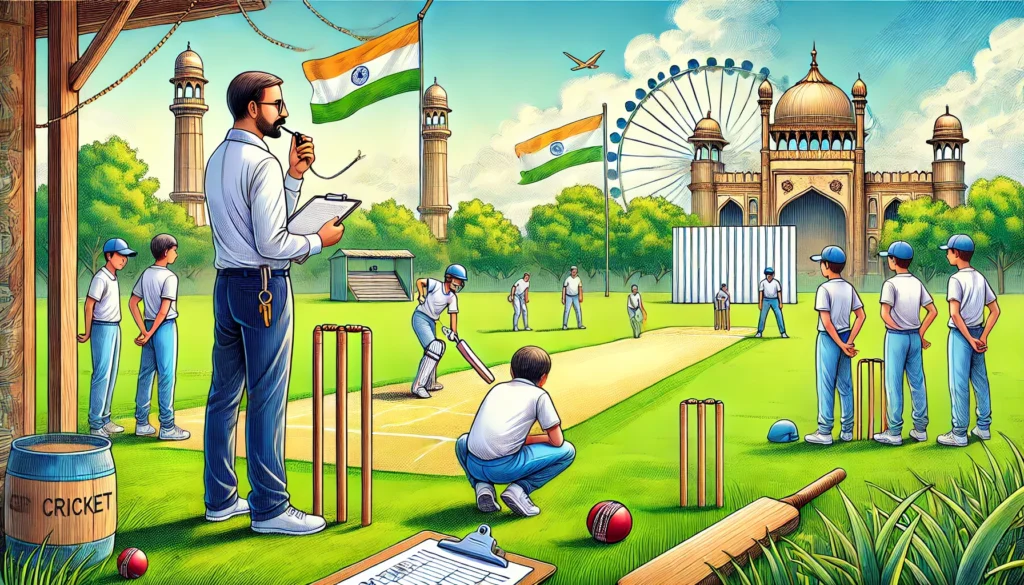Cricket is more than just a sport in India; it’s a way of life, and the demand for skilled cricket coaches is ever-growing. Starting a career in cricket coaching can be a rewarding journey, but it requires dedication, a deep understanding of the game, and the right qualifications. As cricket evolves with new formats and challenges, the role of a coach becomes even more crucial in shaping the next generation of players. Whether you’re aiming to work with young players or professional athletes, building a career as a cricket coach offers many pathways and opportunities for growth.
Understanding the Basics of Cricket Coaching
Before embarking on a career in cricket coaching, it’s essential to understand the fundamentals of the game. A good coach must have a strong grasp of the basic rules, techniques, and strategies of cricket. This includes knowing how to teach proper batting, bowling, and fielding techniques, and how to correct players’ mistakes. Additionally, a coach must be well-versed in the mental aspects of the game, including helping players deal with pressure and develop game awareness.
A strong foundation in cricket coaching also requires an understanding of player development. Coaches must know how to identify the strengths and weaknesses of each player and create personalized training programs that help athletes improve their skills. For example, a coach should be able to design batting drills to enhance timing and hand-eye coordination or set up fielding drills that improve reaction time and accuracy.
Moreover, effective communication is key in cricket coaching. Whether you’re working with young beginners or seasoned professionals, being able to clearly explain techniques, tactics, and the reasoning behind decisions is critical. Coaches need to motivate players and maintain a positive environment, fostering teamwork and sportsmanship while pushing players to reach their potential.
Understanding match strategies is also important. Coaches must be adept at analyzing opposition teams, developing game plans, and adapting tactics during a match. This strategic insight separates good coaches from great ones, allowing them to make crucial in-game adjustments that can turn the tide of a match.
Required Qualifications and Certifications for Cricket Coaches in India
To build a career as a cricket coach in India, obtaining the right qualifications and certifications is crucial. The Board of Control for Cricket in India (BCCI) offers structured coaching programs that equip aspiring coaches with the necessary skills and knowledge. These certifications are divided into various levels, each catering to a different aspect of coaching.
Levels of Coaching Certifications in India
The BCCI’s coaching certifications begin with the Level 1 program, which focuses on grassroots coaching. This level is designed for individuals who want to work with beginners and youth teams. Coaches at this level learn how to teach basic techniques, create training drills, and foster an understanding of the game among younger players.
The Level 2 certification is intended for coaches working with more advanced players, such as club or academy-level teams. At this stage, coaches are trained in more complex aspects of the game, including advanced batting and bowling techniques, team strategy, and player management.
Finally, the Level 3 certification is for those aspiring to coach at the professional level, including national or IPL teams. This advanced program covers high-performance coaching, focusing on fine-tuning players’ skills, handling media, and developing winning strategies.
Importance of Continuous Professional Development
In addition to formal certifications, continuous professional development is critical for cricket coaches. The game is constantly evolving, and coaches must stay updated on the latest techniques, tactics, and technologies in the sport. Attending workshops, seminars, and advanced coaching courses helps coaches refine their skills and keep up with new developments in cricket.
Steps to Start a Cricket Coaching Career in India
- Develop a Deep Understanding of the Game
The first step in becoming a successful cricket coach is to develop a thorough understanding of the game. Watch matches, study player techniques, and immerse yourself in cricket history and strategy. This knowledge is the foundation of your coaching career. - Get Certified Through Recognized Cricket Coaching Programs
Enroll in a certified coaching program, such as those offered by the BCCI. Begin with the Level 1 certification and work your way up through the levels as you gain more experience. Each certification will provide you with the skills needed to coach different levels of players, from beginners to professionals. - Gain Practical Experience by Working with Local Teams
Once you’ve obtained your coaching certification, it’s important to gain hands-on experience. Start by coaching local school or club teams, where you can apply your knowledge and develop your coaching style. The more you work with players, the more you’ll learn about managing different personalities and skill levels. - Network with Professional Coaches and Organizations
Building connections in the cricket community is key to advancing your career. Attend cricketing events, join coaching forums, and seek mentorship from experienced coaches. Networking can open doors to coaching opportunities at higher levels and help you learn from established professionals in the field. - Continuously Improve Through Workshops and Seminars
Stay updated on the latest coaching techniques and developments in cricket by attending coaching workshops and seminars. These events offer valuable insights into new trends and strategies in cricket coaching and allow you to sharpen your skills and knowledge.
Challenges and Opportunities in Cricket Coaching
Becoming a cricket coach in India presents both challenges and opportunities. One of the biggest challenges is the competition. Cricket is the most popular sport in India, and many aspiring coaches are vying for positions at various levels, from school teams to professional leagues. Breaking into the professional coaching scene requires exceptional skill, dedication, and networking.
Another challenge is the lack of access to advanced training facilities, particularly in rural areas. Coaches working in underdeveloped regions may struggle to find the resources and infrastructure needed to provide high-quality training to their players. However, this also presents an opportunity for coaches who are passionate about grassroots development to make a significant impact.
On the flip side, the rise of professional cricket leagues, such as the IPL, and the increased focus on sports academies provide many opportunities for coaches. With more investments being made in cricket infrastructure and development programs, there are growing opportunities to work with both emerging talents and established players.
Additionally, technology is transforming cricket coaching. Video analysis, data-driven strategies, and fitness tracking are becoming integral parts of coaching. Coaches who embrace these tools have an opportunity to stand out and offer more effective training programs to their teams.
The Future of Cricket Coaching in India
The future of cricket coaching in India looks promising, with increasing demand for skilled coaches at all levels of the game. As cricket continues to grow in popularity, particularly with the expansion of leagues like the IPL and increased international participation, the need for qualified coaches will only rise.
One of the key drivers of future growth is the integration of technology in coaching. Video analysis, artificial intelligence, and data-driven performance tracking will become standard tools for cricket coaches, helping them analyze player performances in greater detail and make more informed decisions. Coaches who adapt to these changes and incorporate them into their training methods will be at the forefront of the profession.
Furthermore, the continued focus on grassroots development will ensure that cricket coaching remains a vital part of India’s sporting culture. As more schools and academies invest in coaching programs, young players across the country will have greater access to professional coaching, creating a new generation of cricketing talent.
In conclusion, the future of cricket coaching in India is filled with opportunities. As the sport evolves, so too will the role of the coach, with technology and grassroots development driving the next wave of innovation in the field.



